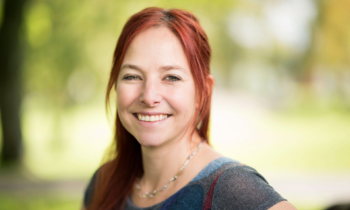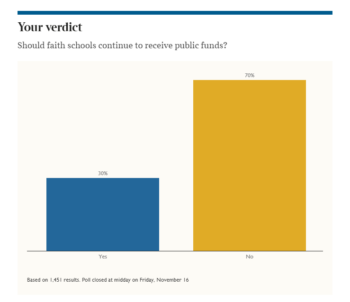 A piece in the Sunday Times about Humanists UK President-elect Professor Alice Roberts has led some to conclude that she and her husband chose to send their children to religious schools, whilst simultaneously campaigning against them. This is incorrect.
A piece in the Sunday Times about Humanists UK President-elect Professor Alice Roberts has led some to conclude that she and her husband chose to send their children to religious schools, whilst simultaneously campaigning against them. This is incorrect.
In response to the piece, Alice commented: ‘We applied to the only two non-religious state schools in our area but didn’t get in. The only other state schools were religious so, like hundreds of thousands of parents, we had no choice other than of a faith school. This is the whole point of why Humanists UK’s schools campaign is so important and why I feel so passionately about it – to make sure the situation my husband and I faced is not faced by other parents in the future.’
A poll published on 16 November by The Sunday Times found 70% of readers were against the state funding of faith schools.

What the Church says about the purpose of its schools
Some have also suggested that Church of England schools do not seek to proselytise. This is contradicted by, for example:
- One of the key conclusions of the Dearing Report, the Church’s landmark 2001 report that set their growing in number again, was that ‘Church schools should nourish those of faith; encourage those of other faiths; and challenge those of no faith.’
- Its follow-up, the 2012 Chadwick Report, similarly outlines as a ‘key premise that applies equally to children of the faith, of other faiths and of no faith’, that Church schools must ‘Work towards every child and young person having a life-enhancing encounter with the Christian faith and the person of Jesus Christ’.
- Upon publication of the Chadwick Report, the bishop then in charge of education for the Church said: ‘[W]e have to grasp that our Church schools are absolutely and irrevocably at the heart of our mission.. In Oxford, we have 55,000 people on our electoral rolls and we have got over 52,000 children every day in our Church schools. Children with all their life before them, with or without faith. Nationally we have a million parishioners every day in our schools. And these schools have a whole hinterland of families, well disposed towards the Church of course, in most cases.
‘What an opportunity – but are we up to it? Do we train our clergy for that opportunity or do we see engagement with schools as optional? We clergy ought to have a camp bed in these schools I think. I say sometimes to our clergy that “You can’t say that doing funerals is an optional extra, and we can’t say that doing schools is an optional extra.” It’s absolutely at the heart of our mission. We don’t have to bemoan the fact that our Sunday school is struggling if there are 300 children at the local Church school. [We must therefore focus on] truly owning the centrality of our Church schools in our mission. And if we really did that, that’s a real culture change: it’s not just playing with words and ticking boxes, because that’s the Church in our schools, not just in our sacred buildings.
…
‘If we can get this joined up and based on gospel values, we have something truly inspiring to offer, and we begin, as I say, to really embed this Christian story right at the heart of our society, of our communities all over the land.
…
‘So in an age of creeping scepticism about religion, we need this confidence that we have the greatest story ever lived, one with never ending relevance to human life. So we need to make sure that our schools are so rooted in that story – in the life, death and new life of Jesus Christ – that people will be thrilled and challenged by what they see. And it will affect beliefs, behaviour and values – the whole deal.’
Notes
For further comment or information, please contact Humanists UK Director of Public Affairs and Policy Richy Thompson at richy@humanists.uk or on 020 3675 0959.
For more information about our education campaigns, visit https://humanists.uk/campaigns/schools-and-education/
At Humanists UK, we advance free thinking and promote humanism to create a tolerant society where rational thinking and kindness prevail. Our work brings non-religious people together to develop their own views, helping people be happier and more fulfilled in the one life we have. Through our ceremonies, education services, and community and campaigning work, we strive to create a fair and equal society for all.
